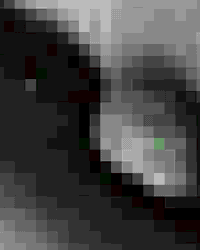PREMA MURTHY/AMORPH
AN E-TERVIEW
by ricardo dominguez
December 10, 1996
New York City
Q: Your digital performances are manifestations of the
cyborgflesh alluded to by Donna Harraway and Sadie Plant--
a mutation of women, machines, and hallucinogenic spaces
which unbind the previous narratives of women's bodies
and erotics. Has exploring the spaces between the Body-without-organs
and flesh created a different subjective state of erotics for you--or
are you still having to struggle with what is emgergning in this
alien zone?
A: My imagery and performances are examinations into the realm of
transgendered imaginary beings constructed by a synthesis of the physical
and the technological. For me, this exploration is about process-a back
and forth between struggle and acceptance of the constructed and the
natural. This back and forth between the constructed and natural can be traced
throughout sex/gender politics. Parallel to that, these same issues are also
found in the techno-political situation--especially in cyborg theory.
Q: Is digiflesh erotics different from previous forms of
flesh-to-flesh contact--or does it still carry strains of
our sexual histories? Or are this new body your creating
outside of sexual codings--an amorphic being--that is nolonger bound by
the cock or the cunt--is this digitalbeing still erotic or beyond it?

A: Flesh, digital or not is an erotic form. It is a surface onto which society/culture projects. What people choose to to project onto this flesh-y surface is rooted in a sexual history that has been ingrained consciously and sub-consciously into our collective minds. My goal is to metaphorically acknowledge this train of thought and disrupt it, distort it and bend it out of shape. Digiflesh is about creating a form that yes, is erotic but moves beyond our ingrained imagination to an unseen space.
Q: Are these digigurl-subjectives part of a deterritorialization of empowerment--which nolonger bound by the narrative codes of feminist agendas of the '70's and 80's. Is WEBgurlism cracking open porn and allowing it to spillout into an unavowable spasm of pleasure that has no name?
A: I have always seen sexuality as a source of power for women which in earlier feminist agendas has not always been the case. There is something very seductive and empowering in allowing others to see you as a sexual being but at the same time can be constraining if what people see does not move beyond that. In earlier feminist agendas there seems to be some type of protocol for expressing your sexuality. It's very reactionary--either be asexual and hate men or be a whore/bitch and dominate men. I guess now that we've figured out men aren't so bad after all, we can relax. We do not need agendas to protect us from taking responsibilty for making our own choices.
Q: What is the future of desire when it is caught on/in the Net?
A: I see desire on the net becoming more introspective. Just like when you see something in writing, you have time to deliberate over what is being said. I see the same on thing happening on the net. Because you are interacting with text, images, etc, you see it up on screen, you have to make choices on where to click, what to take time out to download. It makes you stop and think, if not for a brief second, if it's really worth it and why.
ricardo dominguez
Email: ThingReviews
To post a response fill out the following form and click the "Submit" button. Or go back...
Scroll down to read messages.
doll yoko -- glastonb@next.com.au
Responds:
this hole
Ric,
It's Betsey from Franklin Furnace. The above interview with Prema is very interesting and a bit weird.
Do you have her email address? And where does she perform or is it just on-line.
See you later. Did you like the cheesecake?
Betsey
For more cheese cake and weird stuff you can
e-mail: the amorph at mimic@inch.com !
ricardo
betseyg -- betseyg@mfaphoto.sva.edu
Responds:
ricardo dominguez -- rdom@thing.net
Responds:
